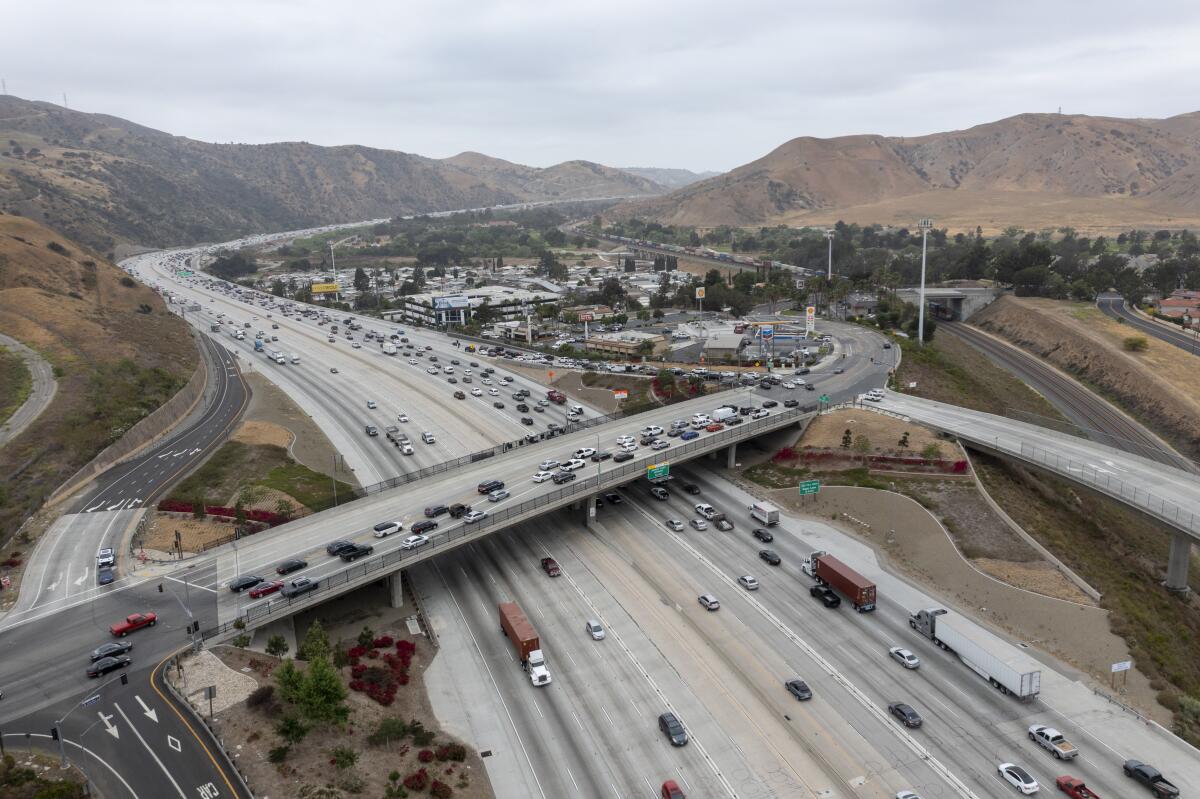Newsom vetoes bill that would have allowed cannabis advertising on freeway billboards

- Share via
SACRAMENTO — Gov. Gavin Newsom vetoed legislation Friday that would have allowed cannabis products to be advertised on freeway billboards in most of California, a bill that sought to negate a court order in November that had banned the signs.
The bill would have permitted marijuana ads on billboards along interstate freeways and state highways that cross state borders, except within 15 miles of another state.
“When the voters passed Proposition 64, they enacted robust protections shielding youth from exposure to cannabis and cannabis advertising,” Newsom said in a veto message. “Among other things, voters completely prohibited billboard-based cannabis advertising on all Interstate Highways, and on all State Highways that cross the California border. Allowing advertising on these high-traffic thoroughfares could expose young passengers to cannabis advertising.”
Assemblyman Bill Quirk (D-Union City) said his bill was necessary to help the state’s legal cannabis industry, which has struggled in the face of high taxes and bans on cannabis shops by most cities.
“We have not done enough to help the legal cannabis industry thrive,” Quirk said. “The legal cannabis industry has a very limited and narrow set of marketing avenues available to them. Removing their ability to promote their legitimate business along hundreds of miles of roadway does nothing but help the illicit market.”
A judge ruled in November that California officials exceeded their authority when they allowed commercial cannabis businesses to advertise on billboards along the state’s interstate freeways in violation of Proposition 64, the legalization initiative approved by voters in 2016.
State officials interpreted Proposition 64’s provision barring ads on interstate highways as meaning they could ban billboards within 15 miles of the state border but allow them elsewhere.
The state Bureau of Cannabis Control determined that allowing billboards, except within 15 miles of a border, “satisfied the intent of Proposition 64” and also “provided assurance that licensees, including those located in jurisdictions along the California border, would still have an opportunity to advertise and market their commercial cannabis operations within the radius limitations.”
However, San Luis Obispo County Superior Court Judge Ginger E. Garrett ruled that Proposition 64, because it was approved by voters, could not be amended by the state bureau through a regulation.
The ruling forced the state to direct cannabis firms to remove their ads from billboards in areas that included 4,315 miles of interstate highways, including the 5 and the 80, and state highways that cross state borders.
Attorney Saro Rizzo filed the lawsuit on behalf of a San Luis Obispo father of two who thought Proposition 64 would prohibit freeway ads that could be seen by his teenagers. Rizzo said the bill was improper because the state Constitution requires changes to initiatives to be put to a vote of the people unless the ballot measure provides for legislative amendment, which Proposition 64 did not.
“It unconstitutionally seeks to amend Proposition 64 in a manner contrary to the purposes and intent of the act because it eviscerates Prop. 64’s mandate of a blanket ban on those highways,” Rizzo said of the legislation.
Rizzo noted that Newsom was instrumental in putting Proposition 64 on the ballot and was the highest-level politician who supported the initiative.
“Needless to say, he was, and is, well aware of Prop. 64’s ban on marijuana billboard ads,” Rizzo said.
The lawyer cited a ballot argument submitted by proponents of the initiative that, appearing in the official voter guide, said Proposition 64 “contains the nation’s strictest child protections: warning labels, child-resistant packaging, and advertising restrictions, and it requires keeping marijuana out of public view, away from children.”
Rizzo had called on the governor to veto the new legislation “in order to remain true to your own words and to uphold the will of the voters,” and to “prioritize children’s health and safety over corporate cannabis profits.”
Elizabeth Ashford, a spokesperson for the cannabis company Eaze, said Saturday that the governor’s veto further hamstrings the ability of licensed marijuana companies to compete with the illicit, unregulated market.
“This veto hands another win to California’s sprawling illegal cannabis industry, and ensures that huge volumes of untested, illicit cannabis will continue to flood California,” she said. “It does not protect children; it protects the unlicensed businesses that sell to them.”
More to Read
Sign up for Essential California
The most important California stories and recommendations in your inbox every morning.
You may occasionally receive promotional content from the Los Angeles Times.











